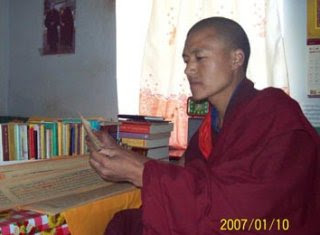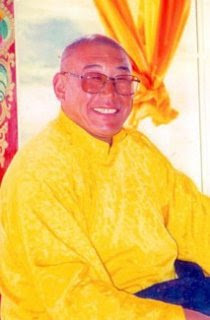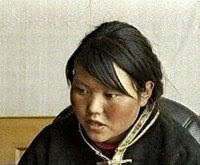Agam's Gecko


Thursday, April 23, 2009
MORE TIBETANS SHOT, TORTURED, PARADED, GIVEN SHOW TRIALS AND DEATH SENTENCES; CHINESE TANTRUM TO CONTINUE
| A |
nother incident of Chinese troops shooting protesters has been reported from the Kardze Tibetan "Autonomous" Prefecture this month. Residents of Thangkya and Thangkya Depa towns in Nyagrong County held a peaceful demonstration on April 15 related to a harsh court ruling against three Tibetans who had protested in March this year, as well as the violent crackdown against the farming boycott campaign. Chinese security forces with 13 armoured personnel carriers began firing indiscriminately at the protesters.
At least nine Tibetans including one woman were arrested in the incident which also injured an unknown number. No deaths were reported, according to a report by Voice of Tibet radio. The arrested woman is identified as Aga, while the men arrested are Gonpo Tsewang, Yiga, Alo, Drakbe, Dawa Drakpa, Gyashe, Kyaka and Gonbe (who sustained gunshot wounds to his leg).
Following the (earlier reported here) explosion last month at an unoccupied police station in Bathang County, Kardze T-"A"-P, Chinese armed forces and Public Security Bureau personnel carried out house-to-house raids in Gangru village, Pogurshi township on April 14. Around 70 security forces conducted the operation, vowing not to leave until at least 10 Tibetans had been arrested. At the time of the explosion, when banners such as "Chinese go out of Tibet" and "Tibet belongs to Tibet" were displayed in the area, PSB officials had tried to take in four Tibetan suspects but they evaded arrest.
The farmlands of this village also remain unploughed, though whether this can be attributed to the farming boycott or to the fact that many of the local youth have fled the area due to being targets of the Chinese manhunt, is not clear. Residents had also strongly resisted the forced patriotism re-education campaign which officials subjected them to in May last year.
A Buddhist monk named Shedup, aged around 40, had been arrested last year for allegedly protesting in Rebkong County, Amdo in March 2008. Shedup was reportedly seriously beaten and tortured in custody, and was later released. His name then appeared on a wanted list just prior to this year's March 10th uprising anniversary. His treatment while in custody last year must have been particularly horrible — around April 2 he committed suicide at his monastery, believed to be the Tarjang Monastery. Shedup had previously pursued his studies in India at Lubum Khangtsen, Gaden Jangtse Monastery, and returned to Tibet via Nepal in 2006.
In January this year a protest was held by the monks of Denma Choekhor Monastery in Jomda County, Chamdo Prefecture (Tibetan "Autonomous" Region). The abbot and a number of monks left the monastery fearing their arrest. On April 1 the Chamdo PSB dispatched 15 officers to arrest the abbot in Jyekundo (western Amdo, Ch: Qinghai). An unknown number of monks, including the former prefect Ven. Sonam Gelek and Tseten Sonam were also taken into custody.
On the same day Chinese paramilitaries raided the Tsetsang Monastery in Kardze, arresting 40 year old monk Sonam Nyima. Sonam was responsible for purchasing daily needs of the monastery. His nephew Tsering Gyurmey had left the same monastery after his name appeared on a wanted list due to involvement in protests last March, and Tsering's younger brother Tenzin Ngodup is now serving a three year sentence for protesting on May 20, 2008. A separate report on the incident said that the security forces ransacked the monastery and took away five monks on arbitrary charges.
Following their arrest, Tibetans like these often become part of a travelling Uncle Hu's Fabulous Cultural Revolution Revival show. Farming boycott supporters in Kardze, for example, were paraded around on trucks through several villages on April 5 — heads shaved, arms and legs shackled, with Chinese soldiers pushing their heads down while officials bellowed the accusations through loudspeakers. Onlookers were warned of similar treatment should they dare to engage in "separatist activities." Only three of the fifteen parade props have been identified; Jhampa Dhondup, 27, from Tsitsang Monastery, Kardze, arrested March 19 for supporting the boycott; Taphel, around 56, arrested for an unknown crime on March 19; Tsering Wangrab, 42, arrested in Lhopa village over the farm boycott.
A Tibetan scholar of Buddhism at the Gomang Monastery in Ngaba Prefecture was arrested around April 2 for his writings. Dokru Tsultrim, 27 (see photo at top), was apprehended in his room at the monastery and his whereabouts remain unknown. The monk hails from Mangra County, Tsolho T-"A"-P in Amdo (Ch: Qinghai) and had studied at the Lutsang and Ditsa Monasteries in Mangra County before joining Gomang in 2005.
Dokru Tsultrim had recently written two articles critical of the Chinese government which appeared in a journal called Khawe Tse Sog, which resulted in accusations of "sedition" and supporting the "motivations of Dalai supporters". The journal has since ceased publication. A number of Tibetans have been arrested recently for their writings. Kunchok Tsephel, who ran a Tibetan language and culture website Chomei ("Lamp"), was arrested on February 26, and Kunga Tsayang, a writer-photographer was arrested for his essays on the website Zin-dris ("Jottings") on March 17.
 Golog Jigme Gyatso has again been released from prison. Photo: Jigdrel |
Both filmmakers were arrested in March 2008, but Jigme was released in October and re-arrested last month. Dhondup Wangchen remains in prison. In their film, ordinary Tibetans were given the opportunity to express their views about their country. According to the ATJ, a heavy fine of several thousand yuan was imposed on Jigme at the time of his release. The journalists' association also reports that Jigme had sensed the international pressure on Chinese officials who interrogated him, and he felt he was being treated unusually better than other prisoners. A small but important indication that international pressure can have positive effects on face-conscious Chinese authorities.
Around the time of a major Tibetan uprising in 1988-89, Jigme was the leader of a youth organisation called the "Association of Tibetan Freedom Movement". In the following years he engaged in pro-independence activism, including the distribution and posting of freedom leaflets around Ganden Monastery and in Lhasa city itself, and organising a Lhasa demonstration in 1992. He was under surveillance and was finally arrested at the Jokhang Temple on March 30, 1996, and sentenced to 15 years for "endangering national security" and "incitement". He was held at the Gutsa PSB detention centre and Lhasa's Drapchi Prison before his transfer to Chushul in 2005.
In May 1998 a group of European Union ambassadors were about to visit Drapchi Prison when the prisoners launched a protest which Jigme joined. The protest was brutally suppressed, resulting in the deaths of eight prisoners and sentence extensions for at least 27 inmates. In 2000 the UN Working Group on Arbitrary Detention stated that Jigme was imprisoned for merely "exercising the right to freedom of peaceful assembly." During another protest in Drapchi in March 2004, Jigme shouted "Long Live Dalai Lama!" He was kicked, beaten, shocked with electric batons and his sentence extended for two extra years.
In late 2005 the UN Special Rapporteur on Torture, Dr. Manfred Nowak, met with Jigme in Chushul Prison. After his visit, Dr. Nowak called for the release of Jigme and seven other political prisoners.
"Since he has been convicted of a political crime, possibly on the basis of information extracted by torture, the Special Rapporteur appeals to the government that he be released," Nowak writes in each of the eight cases.The Chinese government accepted none of the recommendations.
Phurbu Rinpoche's Beijing lawyer, Li Fangping told the AP that his client was forced into making a confession after an interrogation lasting four days, during which time physical torture was reportedly inflicted and threats were made against his wife and son if he did not comply.
Prosecutors allege a pistol and more than 100 bullets and cartridges were found under a bed in Phurbu Tsering Rinpoche's living room during a police raid, but the monk has denied the allegation, saying he was framed, Li said.For once, it seems that a Tibetan has a competent lawyer. Let's see if he's allowed to continue with the case. Not asking him about the weapons and not checking them for fingerprints is a strange way to conduct a police investigation. Phurbu Rinpoche is the first senior lama to be charged in relation to the groundswell of protest in Tibet over the past 14 months. Previously, other very prominent religious figures have been prosecuted under fabricated charges, including Khenpo Jigme Phuntsok of the famous Serthar Buddhist Insitute in Kardze, Geshe Sonam Phuntsok of Dargay Monastery in Kardze, Tulku Tenzin Delek Rinpoche the founder of Kham Nalanda Monastery in Kardze, and Bangri Rinpoche the founder of Gyatso Orphanage in Lhasa. More background on the case from the International Campaign for Tibet and Tibetan Centre for Human Rights and Democracy
"The charge is untenable," Li said. "Police didn't ask him about the source of the weapons or check for fingerprints."
The Lhasa Municipal Intermediate People's Court issued a suspended death sentence to a Tibetan man, identified as Penkyi of Sakya County, for "starting fires in two downtown clothing shops on March 14," Xinhua news agency reported, citing a state-run Tibet Daily newspaper. However, the exile Tibetan government, NGOs and monitoring agencies say that Penkyi is a 21-year-old woman from Norbu village, Dogra township in Sakya County. A picture of Penkyi was also posted on the official website of the Tibetan government in exile.In fact all three of these latest sentences were given to women. The charges were in connection with several fires which were set on the one night of riots in Lhasa last year, March 14. One of the fires claimed the life of the store owner, while the other killed five store staff.
If all this sounds like a childish way for a country to behave, that's because it is. There are so very many brilliant Chinese people in this world, but the Communist Party makes China's state actions seem more appropriate for a seven year-old. From the whining over which country the Dalai Lama should be allowed to visit to the stomping of little feet over inclusion of his wisdom in a UNESCO-sponsored book, and from the tantrums thrown when some of its subjects utter unflattering opinions to the paranoid demonization of its perceived enemies who simply want to talk to them with mutual respect, the behaviour of this state has long appeared to this writer as that of a spoiled child.
Apparently His Holiness has noticed the same phenomenon.
The Tibetan spiritual leader told reporters in Japan that while China could boast military, economic and population muscle, it feared even small signs of dissent.On the heavy punishments meted out this week, the Tibetan leader pointed out something which the pop media fails to recognise except on very rare occasions. Chinese courts answer to the Communist Party, and this fact must especially not be ignored in politically motivated cases.
Addressing a Tokyo news conference on a stopover before a speaking tour of Europe and the United States, he said he saw China, "such a big nation, acting like a child."
He said the government routinely arrested individuals with different views, but stressed that "such a big nation of over one billion people (should have) no need for such sort of fear."
"One or two persons have different views, and immediately they are in trouble with the government. No. You're a big nation. You should have more self-confidence."
The exiled Tibetan spiritual leader said the court decision reflected the Chinese Communist Party's control of people "without the rule of law."The Tibetan leader accused Beijing of concealing evidence in these trials, and asked for further investigation and full disclosure of details.
"Actually, everything is controlled by the party. So, all these sentences were politically reasoned," he said during a brief stop at Tokyo's Narita airport on his way to Los Angeles. "We have great reservation about these sentences."
I don't think he really expects such state maturity any more than I do.
.











 Our way of saying "thanks" in the Thai way. Here a nak muay Thai (kickboxer) offers respect and thanks for his teacher (wai khru) before a match. This is our local variation on the ubiquitous "hat tip" used in general blog culture.
Our way of saying "thanks" in the Thai way. Here a nak muay Thai (kickboxer) offers respect and thanks for his teacher (wai khru) before a match. This is our local variation on the ubiquitous "hat tip" used in general blog culture.










